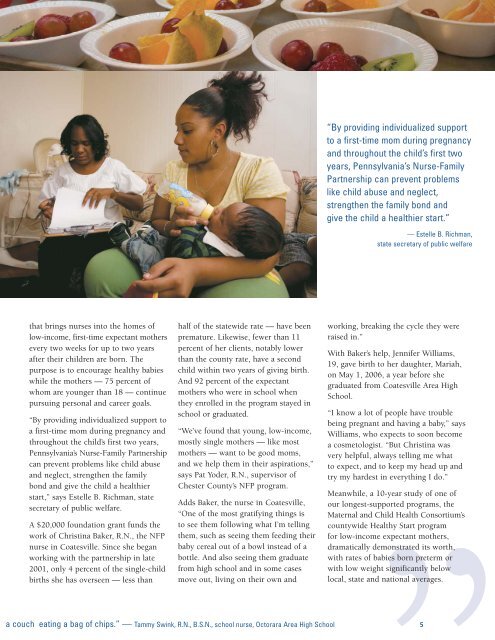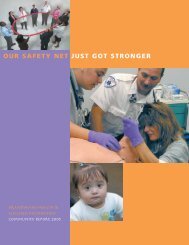12939 Brandywine.qxd - Brandywine Health Foundation
12939 Brandywine.qxd - Brandywine Health Foundation
12939 Brandywine.qxd - Brandywine Health Foundation
Create successful ePaper yourself
Turn your PDF publications into a flip-book with our unique Google optimized e-Paper software.
“By providing individualized support<br />
to a first-time mom during pregnancy<br />
and throughout the child’s first two<br />
years, Pennsylvania’s Nurse-Family<br />
Partnership can prevent problems<br />
like child abuse and neglect,<br />
strengthen the family bond and<br />
give the child a healthier start.”<br />
— Estelle B. Richman,<br />
state secretary of public welfare<br />
that brings nurses into the homes of<br />
low-income, first-time expectant mothers<br />
every two weeks for up to two years<br />
after their children are born. The<br />
purpose is to encourage healthy babies<br />
while the mothers — 75 percent of<br />
whom are younger than 18 — continue<br />
pursuing personal and career goals.<br />
“By providing individualized support to<br />
a first-time mom during pregnancy and<br />
throughout the child’s first two years,<br />
Pennsylvania’s Nurse-Family Partnership<br />
can prevent problems like child abuse<br />
and neglect, strengthen the family<br />
bond and give the child a healthier<br />
start,” says Estelle B. Richman, state<br />
secretary of public welfare.<br />
A $20,000 foundation grant funds the<br />
work of Christina Baker, R.N., the NFP<br />
nurse in Coatesville. Since she began<br />
working with the partnership in late<br />
2001, only 4 percent of the single-child<br />
births she has overseen — less than<br />
half of the statewide rate — have been<br />
premature. Likewise, fewer than 11<br />
percent of her clients, notably lower<br />
than the county rate, have a second<br />
child within two years of giving birth.<br />
And 92 percent of the expectant<br />
mothers who were in school when<br />
they enrolled in the program stayed in<br />
school or graduated.<br />
“We’ve found that young, low-income,<br />
mostly single mothers — like most<br />
mothers — want to be good moms,<br />
and we help them in their aspirations,”<br />
says Pat Yoder, R.N., supervisor of<br />
Chester County’s NFP program.<br />
Adds Baker, the nurse in Coatesville,<br />
“One of the most gratifying things is<br />
to see them following what I’m telling<br />
them, such as seeing them feeding their<br />
baby cereal out of a bowl instead of a<br />
bottle. And also seeing them graduate<br />
from high school and in some cases<br />
move out, living on their own and<br />
working, breaking the cycle they were<br />
raised in.”<br />
With Baker’s help, Jennifer Williams,<br />
19, gave birth to her daughter, Mariah,<br />
on May 1, 2006, a year before she<br />
graduated from Coatesville Area High<br />
School.<br />
“I know a lot of people have trouble<br />
being pregnant and having a baby,” says<br />
Williams, who expects to soon become<br />
a cosmetologist. “But Christina was<br />
very helpful, always telling me what<br />
to expect, and to keep my head up and<br />
try my hardest in everything I do.”<br />
Meanwhile, a 10-year study of one of<br />
our longest-supported programs, the<br />
Maternal and Child <strong>Health</strong> Consortium’s<br />
countywide <strong>Health</strong>y Start program<br />
for low-income expectant mothers,<br />
dramatically demonstrated its worth,<br />
with rates of babies born preterm or<br />
with low weight significantly below<br />
local, state and national averages.<br />
a couch eating a bag of chips.” — Tammy Swink, R.N., B.S.N., school nurse, Octorara Area High School 5




